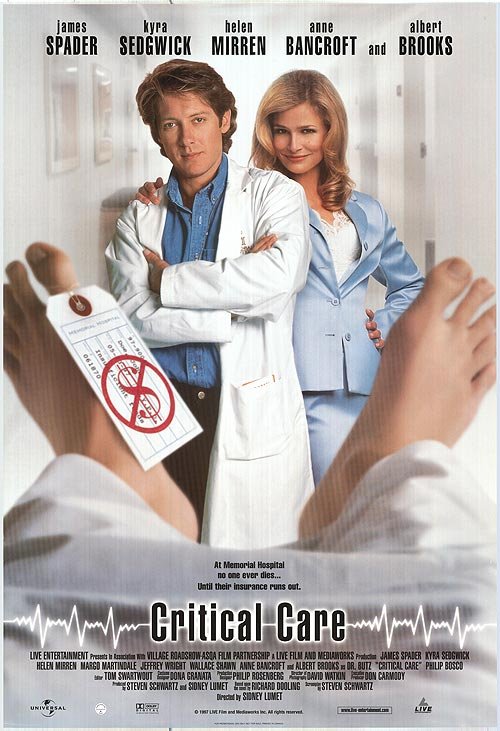“Eugenics & Greed”

| None | Light | Moderate | Heavy | |
|---|---|---|---|---|
| Language | ||||
| Violence | ||||
| Sex | ||||
| Nudity |
What You Need To Know:
CRITICAL CARE wrestles with greed, terminal illness, “playing god,” and the afterlife. One terminal patient wrestles with a demon. A nun tells Dr. Ernst that loving others is the greatest thing we can do on earth. In contrast, the movie also includes immorality such as euthanasia, a hypocritical Christian and a man compromising his ethics for sex. Whether intended or not, the attack on Christian convictions in the movie and the support of euthanasia make it a potent propaganda piece to usher in a brave new world.
Content:
(Pa, C, AB, LL, V, SS, NN, A, D, M) Pagan worldview of wrestling with life & death issues with Christian & anti-Christian elements; 15 obscenities, 7 profanities & some hypocritical remarks; woman helps man die by withholding medical care; strong scene of stripping & foreplay with implied fornication; women in underwear & upper male nudity; alcohol use & abuse; smoking; and, lying, hypocritical attitudes & behaviors
More Detail:
The adept and usually creepy James Spader plays a second year resident physician, named Dr. Werner Ernst, at a major hospital in the critical care unit. He is overworked, women-crazy and only close to his fellow workers, especially unit nurse Stella (Helen Mirren). In bed five, a 74-year-old man, Mr. Potter, lies in a comatose state with little chance of recovery. The man has two daughters who have different opinions on what should be done with him. His youngest daughter, a vain model, named Felicia (Kyra Sedgwick), wants to pull the plug. His eldest daughter, a Bible-thumping conservative, named Connie (Margo Martindale), believes that her father can hear her and wants the life support system maintained. The hospital’s position is to keep the man on life support indefinitely because they are making big money off Mr. Potter’s insurance company. Dr. Ernst must publicly comply with this position, but his humanistically-conditioned conscience tells him that Mr. Potter should be allowed to die.
After Dr. Ernst and Felicia go out on a date, she seduces him and makes him confess before a hidden video camera that he thinks her father’s position is terminal. Felicia takes the tape to her lawyer, and they summon Dr. Ernst to make a court appearance so that a court order can be made to pull the plug. Legal and ethical reasons forbid Dr. Ernst from expressing a diagnoses different from the hospital’s position, so he is in big trouble. An attorney at the hospital discovers that Mr. Potter is worth $10 million. He also discovers that if he dies before his 75th birthday, a few weeks away, Felicia gets his inheritance. However, if he survives past his 75th birthday, Connie gets the money. Felicia blackmails Dr. Ernst by stating that she will present the video tape to the court as evidence (and thus ensuring the demise of his career as a big city doctor), unless he “kills” her father. Caught in the crossfire, Dr. Ernst comes up with a solution which will extricate himself from any wrongdoing and bring the real issue – personal greed − to light in front of all the attorneys and hospital administration.
CRITICAL CARE wrestles with big issues such as greed, terminal illness, “playing god,” and even the afterlife. One terminal patient who is still conscious tells nurse Stella that he wants to die. He gets visions of being visited by “Satan’s little helper,” a demon, who tells him that he might as well give up and go to Hell with him. The man says that he was good, but the demon tells him that that he didn’t love God and didn’t love his neighbor – the two greatest commandments. The demon never mentions Jesus Christ, but when the man does die, he tells the demon that he wants to go with God, and the man is taken into heaven. Of course, he will not get into heaven if his name is not written into the Book of Life − an eternal registration that can only occur if the man has accepted Jesus Christ as Lord and Savior. Thus, the Christian salvation message is not mentioned, but the story does recognize a heaven, hell, devil, and God.
On another occasion, a nun visits Dr. Ernst and tells him that loving others is the greatest thing we can do on earth. She asks him if he is loving Mr. Potter. Finally, the movie reveals that Connie Potter is a hypocrite. Her motivation for keeping her father alive is not love, but greed. When she doesn’t get what she wants, she leaves the Bible aside and says, “If it were any good, I’d get all the money.” While her character doesn’t seem gratuitous or created out of a personal attack on behalf of the writer or director, her foul nature defames Jesus Christ. Other immorality includes a nurse-assisted suicide and a man compromising his ethics for sexual gratification.
The acting is top-notch, and the lighting and set design are created to emphasize the depersonalization of a sterile critical care unit. The script, while complex and character driven, also includes scenes about the clinical nature of treating the dying, as if they weren’t actual persons. The movie is cynical and critical of the current state of affairs with terminal care. It makes a strong statement that doctors, nurses and hospitals don’t always act in the best interest of the patients, but rather in their own interest and in the interests of the health insurance companies.
Even so, it is well to remember that Dr. Goebbels prepared the German people for the holocaust by producing the famous movie I ACCUSE about a woman who has a terminal disease and wants to die. That infamous film changed the opinion of the German people from 80% against euthanasia to 60% in favor. Thereafter, with growing public support, the National Socialists started killing the weak and infirm and progressed to eugenics and the destruction of those people that those in control wanted eliminated.
CRITICAL CARE may not be a political ploy to legalize euthanasia, but it may strengthen the movement for euthanasia laws that have already been proposed in many states. Even if the current crop of pro-euthanasia politicians have no eugenic agenda, legalized euthanasia will bring about the murder of the infirm and lead to the deaths of many who don’t want to die − as it has led to 19,000 wrongful deaths in the tiny country of Holland. Of course, more malignant politicians in the future can use the euthanasia movement to remove their opposition.
Whether intended or not, the attack on Christian convictions in the movie and the support of euthanasia make it a potent propaganda piece to usher in a brave new world.


 - Content:
- Content: 

